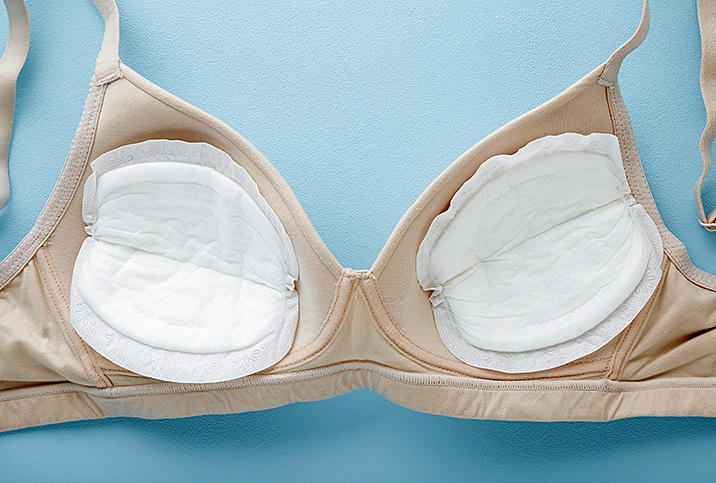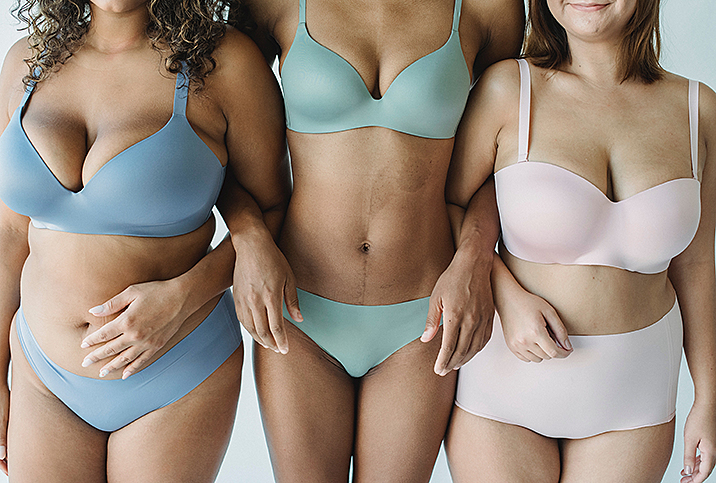How to Keep Your Breasts Healthy During Pregnancy

Of the many changes a woman's body undergoes during pregnancy and childbirth, those to the breasts are particularly noticeable and typically challenging. These changes are natural, caused by hormonal fluctuations that prepare breasts for nursing, no matter your plans to actually nurse.
Most women experience swelling and tenderness in their breasts as early as a few weeks post-conception; in fact, breast tenderness is often one of the first signs of pregnancy. Beginning around weeks six to eight, breasts become heavier and more dense, and the nipples and areolas grow and become darker, which, after childbirth, will allow your baby to more easily find where to latch on during nursing.
Tenderness typically subsides after the first trimester, but breasts may continue to grow. Most women actually go up one to two cup sizes. Stretching skin can itch or result in stretch marks, and increased blood flow means veins may become darker and more prominent.
Around week 16, the breasts are able to produce milk, and some women begin to occasionally leak a thick, yellow fluid called colostrum. Nipples protrude more, and small bumps—Montgomery's tubercles, which are oil-producing glands that lubricate and reduce bacteria—may appear on the areolas.
Breasts typically balloon noticeably in the last few weeks of pregnancy as milk-producing cells grow.
Complications of changing breasts
Some women struggle with extreme breast hypersensitivity during pregnancy, particularly in the early months. Women may also see lumps, which can be caused by a number of conditions: cysts (fluid-filled sacs), fibroadenomas (in the breast lobules) and galactoceles (milk-filled cysts).
While breast cancer is uncommon in women younger than 35, all lumps should be looked at by your doctor. Manual self-exams for early breast cancer detection are more difficult for most women during pregnancy because their breasts are larger, meaning more mass to carefully check; your breasts may also be too sensitive.
There has been some recent reassessment regarding the value of self-exams, but if you feel confident, try to continue exams every four to five weeks. Better still, ask your doctor to do so for you at your prenatal checkups.
Rarely, women experience a small amount of bloody discharge from a nipple. This is probably benign, caused by increased blood vessels in the breast during pregnancy, but it should be evaluated by a clinician.
Stretch marks
For many women, stretch marks are considered an inevitable aspect of pregnancy—50 to 90 percent of women develop them before childbirth—but if you don't like the look of them, there are prevention tricks. Stay hydrated and eat foods that contain vitamins C, D and E, zinc and protein to boost your skin health.
You're going to gain weight—you have to during pregnancy—but if you can prevent rapid weight gain, which contributes to rapid breast growth, you can possibly prevent stretch marks on your breasts. If you know any experienced moms, ask for their recommendations for topical products.
Keep your breasts comfortable
Any number of the changes to your breasts will be uncomfortable. They'll be larger and more sensitive, with larger, more prominent areolas, and they may leak unpredictably. How do you manage your day-to-day life with these issues? What do you wear?
Your old bras may no longer fit, so buy properly fitting, supportive bras. It's one of the greatest moves you can make for yourself during pregnancy. Go specifically to a maternity section or lingerie specialty shop, pick out a style you like and get professionally fitted.
Maternity and nursing bras are different than the ones you may usually wear. Most maternity bras don't have underwires and do have extra hooks in the back for added support. Wider straps contribute to comfort and are less likely to dig into your skin. Thicker, supportive bras are also more likely to hide any colostrum leaks, and may be more comfortable against larger, more sensitive nipples.
Wear a cotton sports bra or a non-constrictive sleep bra if your breasts are causing discomfort at night, and choose especially supportive sports bras if you're still able to work out during this time.
Breasts change a lot during pregnancy. Pay attention to those changes and stay in tune with your body. Talk to your OB-GYN, midwife or primary care physician about any concerns. They can also help discuss options for breast pain or discomfort.

















